第二十八届韩素音青年翻译奖竞赛原文
韩素音青翻译奖赛中文原文及参考译文和解析
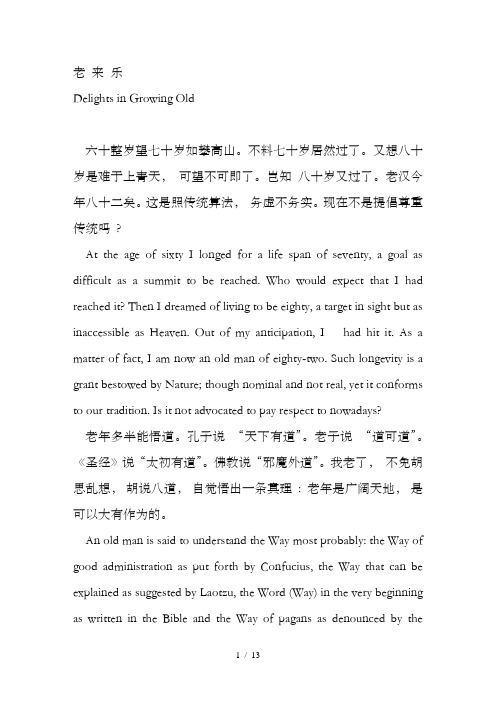
老来乐Delights in Growing Old六十整岁望七十岁如攀高山。
不料七十岁居然过了。
又想八十岁是难于上青天,可望不可即了。
岂知八十岁又过了。
老汉今年八十二矣。
这是照传统算法,务虚不务实。
现在不是提倡尊重传统吗?At the age of sixty I longed for a life span of seventy, a goal as difficult as a summit to be reached. Who would expect that I had reached it? Then I dreamed of living to be eighty, a target in sight but as inaccessible as Heaven. Out of my anticipation, I had hit it. As a matter of fact, I am now an old man of eighty-two. Such longevity is a grant bestowed by Nature; though nominal and not real, yet it conforms to our tradition. Is it not advocated to pay respect to nowadays?老年多半能悟道。
孔子说“天下有道”。
老子说“道可道”。
《圣经》说“太初有道”。
佛教说“邪魔外道”。
我老了,不免胡思乱想,胡说八道,自觉悟出一条真理: 老年是广阔天地,是可以大有作为的。
An old man is said to understand the Way most probably: the Way of good administration as put forth by Confucius, the Way that can be explained as suggested by Laotzu, the Word (Way) in the very beginning as written in the Bible and the Way of pagans as denounced by theBuddhists. As I am growing old, I can't help being given to flights of fancy and having my own Way of creating stories. However I have come to realize the truth: my old age serves as a vast world in which I can still have my talents employed fully and developed completely.七十岁开始可以诸事不做而拿退休金,不愁没有一碗饭吃,自由自在,自得其乐。
历届韩素音翻译大奖赛竞赛原文及译文
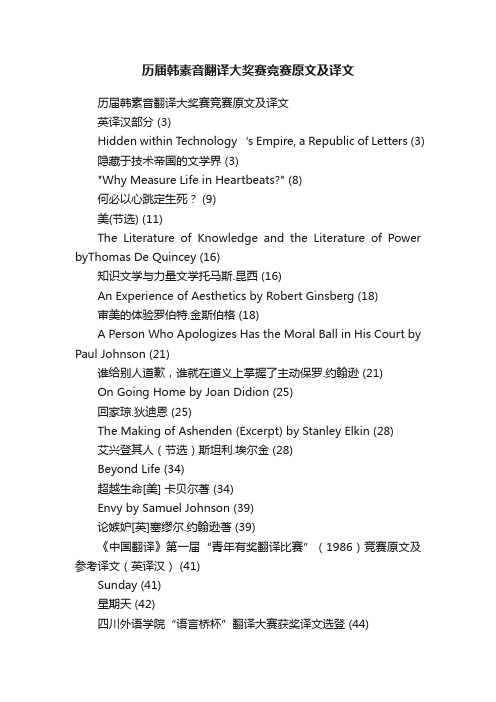
历届韩素音翻译大奖赛竞赛原文及译文历届韩素音翻译大奖赛竞赛原文及译文英译汉部分 (3)Hidden within Technology‘s Empire, a Republic of Letters (3)隐藏于技术帝国的文学界 (3)"Why Measure Life in Heartbeats?" (8)何必以心跳定生死? (9)美(节选) (11)The Literature of Knowledge and the Literature of Power byThomas De Quincey (16)知识文学与力量文学托马斯.昆西 (16)An Experience of Aesthetics by Robert Ginsberg (18)审美的体验罗伯特.金斯伯格 (18)A Person Who Apologizes Has the Moral Ball in His Court by Paul Johnson (21)谁给别人道歉,谁就在道义上掌握了主动保罗.约翰逊 (21)On Going Home by Joan Didion (25)回家琼.狄迪恩 (25)The Making of Ashenden (Excerpt) by Stanley Elkin (28)艾兴登其人(节选)斯坦利.埃尔金 (28)Beyond Life (34)超越生命[美] 卡贝尔著 (34)Envy by Samuel Johnson (39)论嫉妒[英]塞缪尔.约翰逊著 (39)《中国翻译》第一届“青年有奖翻译比赛”(1986)竞赛原文及参考译文(英译汉) (41)Sunday (41)星期天 (42)四川外语学院“语言桥杯”翻译大赛获奖译文选登 (44)第七届“语言桥杯”翻译大赛获奖译文选登 (44)The Woods: A Meditation (Excerpt) (46)林间心语(节选) (47)第六届“语言桥杯”翻译大赛获奖译文选登 (50)第五届“语言桥杯”翻译大赛原文及获奖译文选登 (52)第四届“语言桥杯”翻译大赛原文、参考译文及获奖译文选登 (54) When the Sun Stood Still (54)永恒夏日 (55)CASIO杯翻译竞赛原文及参考译文 (56)第三届竞赛原文及参考译文 (56)Here Is New York (excerpt) (56)这儿是纽约 (58)第四届翻译竞赛原文及参考译文 (61)Reservoir Frogs (Or Places Called Mama's) (61)水库青蛙(又题:妈妈餐馆) (62)中译英部分 (66)蜗居在巷陌的寻常幸福 (66)Simple Happiness of Dwelling in the Back Streets (66)在义与利之外 (69)Beyond Righteousness and Interests (69)读书苦乐杨绛 (72)The Bitter-Sweetness of Reading Yang Jiang (72)想起清华种种王佐良 (74)Reminiscences of Tsinghua Wang Zuoliang (74)歌德之人生启示宗白华 (76)What Goethe's Life Reveals by Zong Baihua (76)怀想那片青草地赵红波 (79)Yearning for That Piece of Green Meadow by Zhao Hongbo (79)可爱的南京 (82)Nanjing the Beloved City (82)霞冰心 (84)The Rosy Cloud byBingxin (84)黎明前的北平 (85)Predawn Peiping (85)老来乐金克木 (86)Delights in Growing Old by Jin Kemu (86)可贵的“他人意识” (89)Calling for an Awareness of Others (89)教孩子相信 (92)To Implant In Our Children‘s Young Hearts An Undying Faith In Humanity (92)心中有爱 (94)Love in Heart (94)英译汉部分Hidden within Technology’s Empire, a Republic of Le tters 隐藏于技术帝国的文学界索尔·贝娄(1)When I was a boy ―discovering literature‖, I used to think how wonderful it would be if every other person on the street were familiar with Proust and Joyce or T. E. Lawrence or Pasternak and Kafka. Later I learned how refractory to high culture the democratic masses were. Lincoln as a young frontiersman read Plutarch, Shakespeare and the Bible. But then he was Lincoln.我还是个“探索文学”的少年时,就经常在想:要是大街上人人都熟悉普鲁斯特和乔伊斯,熟悉T.E.劳伦斯,熟悉帕斯捷尔纳克和卡夫卡,该有多好啊!后来才知道,平民百姓对高雅文化有多排斥。
第二十七届韩素音青年翻译比赛汉译英优秀奖的译文教学内容
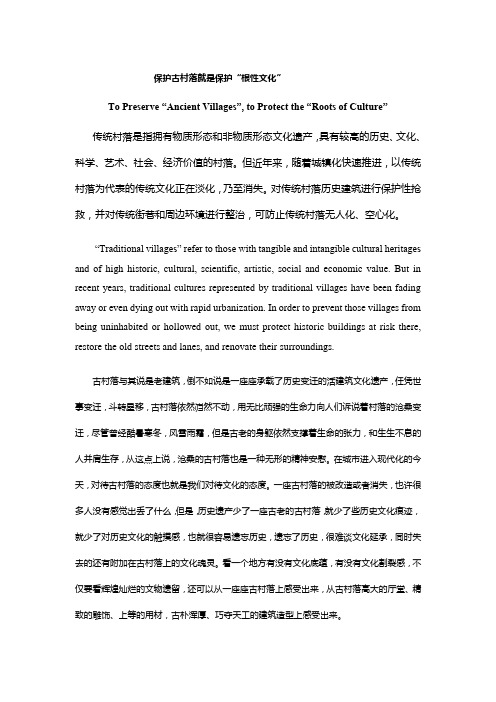
保护古村落就是保护“根性文化”To Preserve “Ancient Villages”, to Protect the “Roots of Culture”传统村落是指拥有物质形态和非物质形态文化遗产,具有较高的历史、文化、科学、艺术、社会、经济价值的村落。
但近年来,随着城镇化快速推进,以传统村落为代表的传统文化正在淡化,乃至消失。
对传统村落历史建筑进行保护性抢救,并对传统街巷和周边环境进行整治,可防止传统村落无人化、空心化。
“Traditional villages” refer to those with tangible and intangible cultural heritages and of high historic, cultural, scientific, artistic, social and economic value. But in recent years, traditional cultures represented by traditional villages have been fading away or even dying out with rapid urbanization. In order to prevent those villages from being uninhabited or hollowed out, we must protect historic buildings at risk there, restore the old streets and lanes, and renovate their surroundings.古村落与其说是老建筑,倒不如说是一座座承载了历史变迁的活建筑文化遗产,任凭世事变迁,斗转星移,古村落依然岿然不动,用无比顽强的生命力向人们诉说着村落的沧桑变迁,尽管曾经酷暑寒冬,风雪雨霜,但是古老的身躯依然支撑着生命的张力,和生生不息的人并肩生存,从这点上说,沧桑的古村落也是一种无形的精神安慰。
第二十八届韩素音青年翻译奖竞赛英汉汉英译文完整版

第二十八届韩素音青年翻译奖竞赛英译汉、汉译英竞赛原文英译汉竞赛原文:On IrritabilityIrritability is the tendency to get upset for reasons that seem – to other people – to be pretty minor. Your partner asks you how work went and the way they ask makes you feel intensely agitated. Your partner is putting knives and forks on the table before dinner and you mention (not for the first time) that the fork should go on the left hand side, not the right. They then immediately let out a huge sigh and sweep the cutlery onto the floor and tell you that you can xxxx-ing do it yourself if you know better. It was the most minor of criticisms and technically quite correct. And now they’ve exploded.There is so much irritability around and it exacts a huge daily cost on our collective lives, so we deserve to get a lot more curious about it: what is really going on for the irritable person? Why, really, are they getting so agitated? And instead of blaming them for getting het up about “little things”, we should do them the honour of working out why, in fact, these things may not be so minor after all.The journey begins by recognising the role of fear in irritability in couples. Behind most outbursts are cack-handed attempts to teach the other person something. There are things we’d like to point out, flaws that we can discern, remarks we feel we really must make, but our awareness of how to proceed is panicked and hasty. We give cack-handed, mean speeches, which bear no faith in the legitimacy (even the nobility) of the act of imparting advice. And when our partners are on the receiving end of these irritable “lessons”, they of course swiftly grow defensive and brittle in the face of suggestions which seem more like mean-minded and senseless assaults on their very natures rather than caring, gentle attempts to address troublesome aspects of joint life.The prerequisite of calm in a teacher is a degree of indifference as to the success or failure of the lesson. One naturally wants for things to go well, but if an obdurate pupil flunks trigonometry, it is – at base – their problem. Tempers can stay even because individual students do not have very much power over teachers’ lives. Fortunately, as not caring too much turns out to be a critical aspect of successful pedagogy.Yet this isn’t an option open t o the fearful, irritable lover. They feel ineluctably led to deliver their “lessons” in a cataclysmic, frenzied manner (the door slams very loudly indeed) not because they are insane or vile (though one could easily draw these conclusions) so much as because they are terrified; terrified of spoiling what remains of their years on the planet in the company of someone who it appears cannot in any way understand a pivotal point about conversation, or cutlery, or the right time to order a taxi.One knows intuitively, when teaching a child, that only the utmost care and patience will ever work: one must never shout, one has to use extraordinary tact, one has to make ten compliments for every one negative remark and one must leave oneself plenty of time…All t his wisdom we reliably forget in love’s classroom, sadly because increasing the level of threat seldom hastens development. We do not grow more reasonable, more accepting of responsibility and more accurate about our weaknesses when our pride has been wounded, our integrity is threatened and our self-esteem has been violated.The complaint against the irritable person is that they are getting worked up over “nothing”. But symbols offer a way of seeing how a detail can stand for something much bigger and more serious. The groceries placed on the wrong table are not upsetting at all in themselves. But symbolically they mean your partner doesn’t care about domestic order; they muddle things up; they are messy. Or the question about one’s day is experienced as a symbol of interrogation, a lack of privacy and a humiliation (because one’s days rarely go well enough).The solution is, ideally, to concentrate on what the bigger issue is. Entire philosophies of life stir and collide beneath the surface of apparently petty squabbles. Irritations are the outward indications of stifled debates between competing conceptions of existence. It’s to the bigger themes we need to try to get.In the course of discussions, one might even come face-to-face with that perennially surprising truth about relationships: that the other person is not an extension of oneself that has, mysteriously, gone off message. They are that most surprising of things, a different person, with a psyche all of their own, filled with a perplexing number of subtle, eccentric and unforeseen reasons for thinking as they do.The decoding may take time, perhaps half an hour or more of concentrated exploration for something that had until then seemed as if it would more rightfully deserve an instant.We pay a heavy price for this neglect; every conflict that ends in sour stalemate is a blocked capillary within the heart of love. Emotions will find other ways to flow for now, but with the accumulation of unresolved disputes, pathways will fur and possibilities for trust and generosity narrow.A last point. It may just be sleep or food: when a baby is irritable, we rarely feel the need to preach about self-control and a proper sense of proportion. It’s not simply that we fear the infant’s intellect might n ot quite be up to it, but because we have a much better explanation of what is going on. We know that they’re acting this way –and getting bothered by any little thing – because they are tired, hungry, too hot or having some challenging digestive episode.The fact is, though, that the same physiological causes get to us all our lives. When we are tired, we get upset more easily; when we feel very hungry, it takes less to bother us. But it is immensely difficult to transfer the lesson in generosity (and accuracy) that we gain around to children and apply it to someone with a degree in business administration or a pilot’s license, or to whom we have been married for three-and-a-half years.We should try to see irritability for what it actually is: a confused, inarticulate, often shameful attempt to get us to understand how much someone is suffering and how urgently they need our help. We should – when we can manage it – attempt to help them out.汉译英竞赛原文:屠呦呦秉持的,不是好事者争论的随着诺贝尔奖颁奖典礼的临近,持续2个月的“屠呦呦热”正在渐入高潮。
韩素英翻译大赛原文
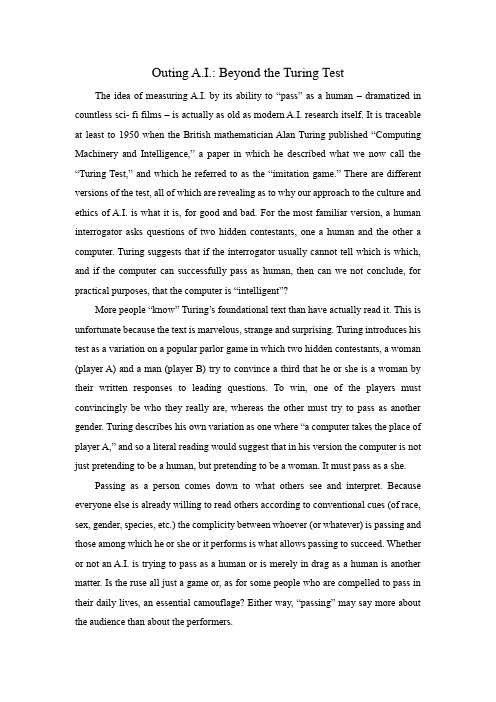
Outing A.I.: Beyond the Turing TestThe idea of measuring A.I. by its ability to “pass” as a human – dramatized in countless sci- fi films – is actually as old as modern A.I. research itself. It is traceable at least to 1950 when the British mathematician Alan Turing published “Computing Machinery and Intelligence,” a paper in which he described what we now call the “Turing Test,” and which he referred to as the “imitation game.” There are different versions of the test, all of which are revealing as to why our approach to the culture and ethics of A.I. is what it is, for good and bad. For the most familiar version, a human interrogator asks questions of two hidden contestants, one a human and the other a computer. Turing suggests that if the interrogator usually cannot tell which is which, and if the computer can successfully pass as human, then can we not conclude, for practical purposes, that the computer is “intelligent”?More people “know” Turing’s foundational text than have actually read it. This is unfortunate because the text is marvelous, strange and surprising. Turing introduces his test as a variation on a popular parlor game in which two hidden contestants, a woman (player A) and a man (player B) try to convince a third that he or she is a woman by their written responses to leading questions. To win, one of the players must convincingly be who they really are, whereas the other must try to pass as another gender. Turing describes his own variation as one where “a computer takes the place of player A,” and so a literal reading would suggest that in his version the computer is not just pretending to be a human, but pretending to be a woman. It must pass as a she.Passing as a person comes down to what others see and interpret. Because everyone else is already willing to read others according to conventional cues (of race, sex, gender, species, etc.) the complicity between whoever (or whatever) is passing and those among which he or she or it performs is what allows passing to succeed. Whether or not an A.I. is trying to pass as a human or is merely in drag as a human is another matter. Is the ruse all just a game or, as for some people who are compelled to pass in their daily lives, an essential camouflage? Either way, “passing” may say more about the audience than about the performers.That we would wish to define the very existence of A.I. in relation to its ability to mimic how humans think that humans think will be looked back upon as a weird sort of speciesism. The legacy of that conceit helped to steer some older A.I. research down disappointingly fruitless paths, hoping to recreate human minds from available parts. It just doesn’t work that way. Contemporary A.I. research suggests instead that the threshold by which any particular arrangement of matter can be said to be “intelligent” doesn’t have much to do with how it reflects humanness back at us. As Stuart Russell and Peter Norvig (now director of research at Google) suggest in their essential A.I. textbook, biomorphic imitation is not how we design complex technology. Airplanes don’t fly like birds fly, and we certainly don’t try to trick birds into thinking that airplanes are birds in order to test whether those planes “really” are flying machines. Why do it for A.I. then? Today’s serious A.I. research does not focus on the Turing Test as an objective criterion of success, and yet in our popular culture of A.I., the test’s anthropocentrism holds such durable conceptual importance. Like the animals who talk like teenagers in a Disney movie, other minds are conceivable mostly by way of puerile ventriloquism.Where is the real injury in this? If we want everyday A.I. to be congenial in a humane sort of way, so what? The answer is that we have much to gain from a more sincere and disenchanted relationship to synthetic intelligences, and much to lose by keeping illusions on life support. Some philosophers write about the possible ethical “rights” of A.I. as sentient entities, but that’s not my point here. Rather, the truer perspective is also the better one for us as thinking technical creatures.Musk, Gates and Hawking made headlines by speaking to the dangers that A.I. may pose. Their points are important, but I fear were largely misunderstood by many readers. Relying on efforts to program A.I. not to “harm humans” (inspired by Isaac Asimov’s “three laws” of robotics from 1942) makes sense only when an A.I. knows what humans are and what harming them might mean. There are many ways that an A.I. might harm us that have nothing to do with its malevolence toward us, and chief among these is exactly following our well-meaning instructions to an idiotic and catastrophic extreme. Instead of mechanical failure or a transgression of moral code, the A.I. maypose an existential risk because it is both powerfully intelligent and disinterested in humans. To the extent that we recognize A.I. by its anthropomorphic qualities, or presume its preoccupation with us, we are vulnerable to those eventualities.Whether or not “hard A.I.” ever appears, the harm is also in the loss of all that we prevent ourselves from discovering and understanding when we insist on protecting beliefs we know to be false. In the 1950 essay, Turing offers several rebuttals to his speculative A.I., including a striking comparison with earlier objections to Copernican astronomy. Copernican traumas that abolish the false centrality and absolute specialness of human thought and species-being are priceless accomplishments. They allow for human culture based on how the world actually is more than on how it appears to us from our limited vantage point. Turing referred to these as “theological objections,” but one could argue that the anthropomorphic precondition for A.I. is a “pre-Copernican” attitude as well, however secular it may appear. The advent of robust inhuman A.I. may let us achieve another disenchantment, one that should enable a more reality-based understanding of ourselves, our situation, and a fuller and more complex understanding of what “intelligence” is and is not. From there we can hopefully make our world with a greater confidence that our models are good approximations of what’s out there.人工智能:超越图灵实验以人工智能“冒充”人的能力的来衡量人工智能的这个概念---已经被数不清的科幻电影搬上了荧幕---实际上已经和现代人工智能研究一样久远了。
第23届韩素音青年翻译奖竞赛英译汉原文

英译汉竞赛原文:Are We There Yet?America’s recovery will be much slower than that from most recessions; but the governmentcan help a bit.“WHITHER goest thou, America?” That question, posed by Jack Kerouac on behalf of the Beat generation half a century ago, is the biggest uncertainty hanging over the world economy. And it reflects the foremost worry for American voters, who go to the polls for the congressional mid-term elections on November 2nd with the country’s unemployment rate stubbornly stuck at nearly one in ten. They should prepare themselves for a long, hard ride.The most wrenching recession since the 1930s ended a year ago. But the recovery—none too powerful to begin with—slowed sharply earlier this year. GDP grew by a feeble 1.6% at an annual pace in the second quarter, and seems to have been stuck somewhere similar since. The housing market slumped after temporary tax incentives to buy a home expired. So few private jobs were being created that unemployment looked more likely to rise than fall. Fears grew over the summer that if this deceleration continued, America’s economy would slip back into recession.Fortunately, those worries now seem exaggerated. Part of the weakness of second-quarter GDP was probably because of a temporary surge in imports from China. The latest statistics, from reasonably good retail sales in August to falling claims for unemployment benefits, point to an economy that, though still weak, is not slumping further. And history suggests that although nascent recoveries often wobble for a quarter or two, they rarely relapse into recession. For now, it is most likely that America’s economy will crawl along with growth at perhaps 2.5%: above stall speed, but far too slow to make much difference to the jobless rate.Why, given th at America usually rebounds from recession, are the prospects so bleak? That’s because most past recessions have been caused by tight monetary policy. When policy is loosened, demand rebounds. This recession was the result of a financial crisis. Recoveries after financial crises are normally weak and slow as banking systems are repaired and balance-sheets rebuilt. Typically, this period of debt reduction lasts around seven years, which means America would emerge from it in 2014. By some measures, households are reducing their debt burdens unusually fast, but even optimistic seers do not think the process is much more than half over.Battling on the busAmerica’s biggest problem is that its politicians have yet to acknowledge that the economy is in for such a long, slow haul, let alone prepare for the consequences. A few brave officials are beginning to sound warnings that the jobless rate is likely to “stay high”. But the political debate is more about assigning blame for the recession than about suggesting imaginative ways to give more oomph to the recovery.Republicans argue that Barack Obama’s shift towards “big government” explains the economy’s weakness, and that high unemployment is proof that fiscal stimulus was a bad idea. In fact, most of the growth in government to date has been temporary and unavoidable; the longer-run growth in government is more modest, and reflects the policies of both Mr Obama andhis predecessor. And the notion that high joblessness “proves” that stimulus failed is simply wron g. The mechanics of a financial bust suggest that without a fiscal boost the recession would have been much worse.Democrats have their own class-warfare version of the blame game, in which Wall Street’s excesses caused the problem and higher taxes on high-earners are part of the solution. That is why Mr. Obama’s legislative priority before the mid-terms is to ensure that the Bush tax cuts expire at the end of this year for households earning more than $250,000 but are extended for everyone else.This takes an unnecessary risk with the short-term recovery. America’s experience in 1937 and Japan’s in 1997 are powerful evidence that ill-timed tax rises can tip weak economies back into recession. Higher taxes at the top, along with the waning of fiscal stimulus and belt-tightening by the states, will make a weak growth rate weaker still. Less noticed is that Mr. Obama’s fiscal plan will also worsen the medium-term budget mess, by making tax cuts for the middle class permanent.Ways to overhaul the engineIn an ideal world America would commit itself now to the medium-term tax reforms and spending cuts needed to get a grip on the budget, while leaving room to keep fiscal policy loose for the moment. But in febrile, partisan Washington that is a pipe-dream. Today’s goals can only be more modest: to nurture the weak economy, minimize uncertainty and prepare the ground for tomorrow’s fiscal debate. To that end, Congress ought to extend all the Bush tax cuts until 2013. Then they should all expire—prompting a serious fiscal overhaul, at a time when the economy is stronger.A broader set of policies could help to work off the hangover faster. One priority is to encourage more write-downs of mortgage debt. Almost a quarter of all Americans with mortgages owe more than their houses are worth. Until that changes the vicious cycle of rising foreclosures and falling prices will continue. There are plenty of ideas on offer, from changing the bankruptcy law so that judges can restructure mortgage debt to empowering special trustees to write down loans. They all have drawbacks, but a fetid pool of underwater mortgages will, much like Japan’s loans to zombie firms, corrode the financial system and harm the recovery.Cleaning up the housing market would help cut America’s unemploy ment rate, by making it easier for people to move to where jobs are. But more must be done to stop high joblessness becoming entrenched. Payroll-tax cuts and credits to reduce the cost of hiring would help. (The health-care reform, alas, does the opposite, at least for small businesses.) Politicians will also have to think harder about training schemes, because some workers lack the skills that new jobs require.Americans are used to great distances. The sooner they, and their politicians, accept that the road to recovery will be a long one, the faster they will get there.。
第二十七届韩素音青年翻译比赛汉译英优秀奖的译文
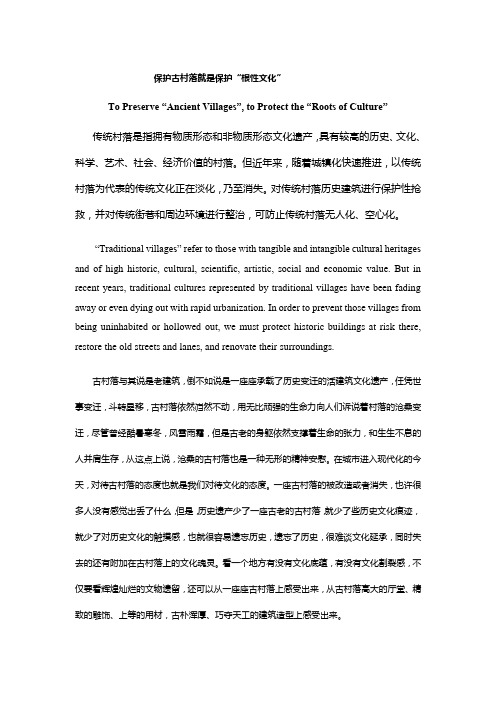
保护古村落就是保护“根性文化”To Preserve “Ancient Villages”, to Protect the “Roots of Culture”传统村落是指拥有物质形态和非物质形态文化遗产,具有较高的历史、文化、科学、艺术、社会、经济价值的村落。
但近年来,随着城镇化快速推进,以传统村落为代表的传统文化正在淡化,乃至消失。
对传统村落历史建筑进行保护性抢救,并对传统街巷和周边环境进行整治,可防止传统村落无人化、空心化。
“Traditional villages” refer to those with tangible and intangible cultural heritages and of high historic, cultural, scientific, artistic, social and economic value. But in recent years, traditional cultures represented by traditional villages have been fading away or even dying out with rapid urbanization. In order to prevent those villages from being uninhabited or hollowed out, we must protect historic buildings at risk there, restore the old streets and lanes, and renovate their surroundings.古村落与其说是老建筑,倒不如说是一座座承载了历史变迁的活建筑文化遗产,任凭世事变迁,斗转星移,古村落依然岿然不动,用无比顽强的生命力向人们诉说着村落的沧桑变迁,尽管曾经酷暑寒冬,风雪雨霜,但是古老的身躯依然支撑着生命的张力,和生生不息的人并肩生存,从这点上说,沧桑的古村落也是一种无形的精神安慰。
韩素音翻译原文(1)
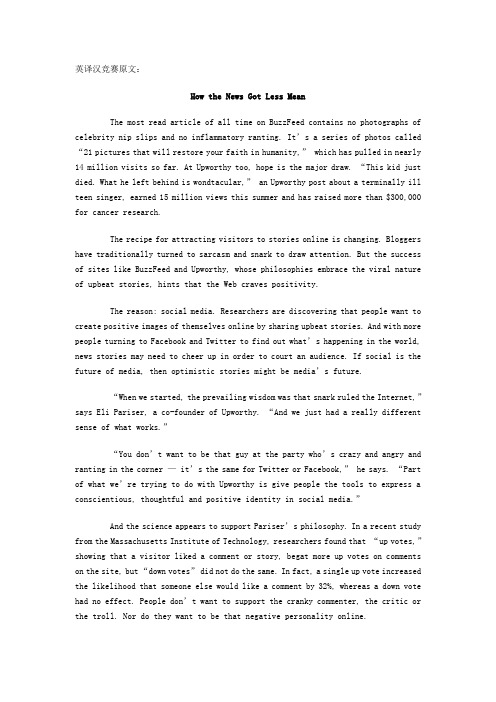
英译汉竞赛原文:How the News Got Less MeanThe most read article of all time on BuzzFeed contains no photographs of celebrity nip slips and no inflammatory ranting. It’s a series of photos called “21 pictures that will restore your faith in humanity,” which has pulled in nearly 14 million visits so far. At Upworthy too, hope is the major draw. “This kid just died. What he left behind is wondtacular,” an Upworthy post about a terminally ill teen singer, earned 15 million views this summer and has raised more than $300,000 for cancer research.The recipe for attracting visitors to stories online is changing. Bloggers have traditionally turned to sarcasm and snark to draw attention. But the success of sites like BuzzFeed and Upworthy, whose philosophies embrace the viral nature of upbeat stories, hints that the Web craves positivity.The reason: social media. Researchers are discovering that people want to create positive images of themselves online by sharing upbeat stories. And with more people turning to Facebook and Twitter to find out what’s happening in the world, news stories may need to cheer up in order to court an audience. If social is the future of media, then optimistic stories might be media’s future.“When we started, the prevailing wisdom was that snark ruled the Internet,”says Eli Pariser, a co-founder of Upworthy. “And we just had a really different sense of what works.”“You don’t want to be that guy at the party who’s crazy and angry and ranting in the corner — it’s the same for Twitter or Facebook,” he says. “Part of what we’re trying to do with Upworthy is give people the tools to express a conscientious, thoughtful and positive identity in social media.”And the science appears to support Pariser’s philosophy. In a recent study from the Massachusetts Institute of Technology, researchers found that “up votes,”showing that a visitor liked a comment or story, begat more up votes on comments on the site, but “down votes” did not do the same. In fact, a single up vote increased the likelihood that someone else would like a comment by 32%, whereas a down vote had no effect. People don’t want to support the cranky commenter, the critic or the troll. Nor do they want to be that negative personality online.In another study published in 2012, Jonah Berger, author of Contagious: Why Things Catch On and professor of marketing at the Wharton School of the University of Pennsylvania, monitored the most e-mailed stories produced by the New York Times for six months and found that positive stories were more likely to make the list than negative ones.“What we share [or like] is almost like the car we drive or the clothes we wear,”he says. “It says something about us to other people. So people would much rather be seen as a Positive Polly than a Debbie Downer.”It’s not always that simple: Berger says that though positive pieces drew more traffic than negative ones, within the categories of positive and negative stories, those articles that elicited more emotion always led to more shares.“Take two negative emotions, for example: anger and sadness,” Berger says. “Both of those emotions would make the reader feel bad. But anger, a high arousal emotion, leads to more sharing, whereas sadness, a low arousal emotion, doesn’t. The same is true of the positive side: excitement and humor increase sharing, whereas contentment decreases sharing.”And while some popular BuzzFeed posts — like the recent “Is this the most embarrassing interview Fox News has ever done?”— might do their best to elicit shares through anger, both BuzzFeed and Upworthy recognize that their main success lies in creating positive viral material.“It’s not that people don’t share negative stories,” says Jack Shepherd, editorial director at BuzzFeed. “It just means that there’s a higher potential for positive stories to do well.”Upworthy’s mission is to highlight serious issues but in a hopeful way, encouraging readers to donate money, join organizations and take action. The strategy seems to be working: barely two years after its launch date (in March 2012), the site now boasts 30 million unique visitors per month, according to Upworthy. The site’s average monthly unique visitors grew to 14 million people over its first six quarters — to put that in perspective, the Huffington Post had only about 2 million visitors in its first six quarters online.But Upworthy measures the success of a story not just by hits. The creators of the site only consider a post a success if it’s also shared frequently on social media. “We are interested in content that people want to share partly for pragmaticreasons,” Pariser says. “If you don’t have a good theory about how to appear in Facebook and Twitter, then you may disappear.”Nobody has mastered the ability to make a story go viral like BuzzFeed. The site, which began in 2006 as a lab to figure out what people share online, has used what it’s learned to draw 60 million monthly unique visitors, according to BuzzFeed. (Most of that traffic comes from social-networking sites, driving readers toward BuzzFeed’s mix of cute animal photos and hard news.) By comparison the New York Times website, one of the most popular newspaper sites on the Web, courts only 29 million unique visitors each month, according to the Times.BuzzFeed editors have found that people do still read negative or critical stories, they just aren’t the posts they share with their friends. And those shareable posts are the ones that newsrooms increasingly prize.“Anecdotally, I can tell you people are just as likely to click on negative stories as they are to click on positive ones,” says Shepherd. “But they’re more likely to share positive stories. What you’re interested in is different from what you want your friends to see what you’re interested in.”So as newsrooms re-evaluate how they can draw readers and elicit more shares on Twitter and Facebook, they may look to BuzzFeed’s and Upworthy’s happiness model for direction.“I think that the Web is only becoming more social,” Shepherd says. “We’re at a point where readers are your publishers. If news sites aren’t thinking about what it would mean for someone to share a story on social media, that could be detrimental.”汉译英竞赛原文:城市的迷失沿着瑗珲—腾冲线,这条1935年由胡焕庸先生发现并命名的中国人口、自然和历史地理的分界线,我们看到,从远距离贸易发展开始的那天起,利益和权力的渗透与分散,已经从根本结构上改变了城市的状态:城市在膨胀,人在疏离。
- 1、下载文档前请自行甄别文档内容的完整性,平台不提供额外的编辑、内容补充、找答案等附加服务。
- 2、"仅部分预览"的文档,不可在线预览部分如存在完整性等问题,可反馈申请退款(可完整预览的文档不适用该条件!)。
- 3、如文档侵犯您的权益,请联系客服反馈,我们会尽快为您处理(人工客服工作时间:9:00-18:30)。
第二十八届韩素音青年翻译奖竞赛原文英译汉竞赛原文:On IrritabilityIrritability is the tendency to get upset for reasons that seem – to other people – to be pretty minor. Your partner asks you how work went and the way they ask makes you feel intensely agitated. Your partner is putting knives and forks on the table before dinner and you mention (not for the first time) that the fork should go on the left hand side, not the right. They then immediately let out a huge sigh and sweep the cutlery onto the floor and tell you that you can xxxx-ing do it yourself if you know better. It was the most minor of criticisms and technically quite correct. And now they’ve exploded.There is so much irritability around and it exacts a huge daily cost on our collective lives, so we deserve to get a lot more curious about it: what is really going on for the irritable person? Why, really, are they getting so agitated? And instead of blaming them for getting het up about “little things”, we should do them the honour of working out why, in fact, the se things may not be so minor after all.The journey begins by recognising the role of fear in irritability in couples. Behind most outbursts are cack-handed attempts to teach the other person something. There are things we’d like to point out, flaws that we can discern, remarks we feel we really must make, but our awareness of how to proceed is panicked and hasty. We give cack-handed, mean speeches, which bear no faith in the legitimacy (even the nobility) of the act of imparting advice. And when our partners are on the receiving end of these irritable “lessons”, they of course swiftly grow defensive and brittle in the face of suggestions which seem more like mean-minded and senseless assaults on their very natures rather than caring, gentle attempts to address troublesome aspects of joint life.The prerequisite of calm in a teacher is a degree of indifference as to the success or failure of the lesson. One naturally wants for things to go well, but if an obdurate pupil flunks trigonometry, it is – at base – their problem. Tempers can stay even because individual students do not have very much power over teachers’ lives. Fortunately, as not caring too much turns out to be a critical aspect of successful pedagogy.Yet this isn’t an option open to the fearfu l, irritable lover. They feel ineluctably led to deliver their “lessons” in a cataclysmic, frenzied manner (the door slams very loudly indeed) not because they are insane or vile (though one could easily draw these conclusions) so much as because they are terrified; terrified of spoiling what remains of their years on the planet in the company of someone who it appears cannot in any way understand a pivotal point about conversation, or cutlery, or the right time to order a taxi.One knows intuitively, when teaching a child, that only the utmost care and patience will ever work: one must never shout, one has to use extraordinary tact, one has to make ten complimentsfor every one negative remark and one must leave oneself plenty of time…All this wisdom we reliably forget in love’s classroom, sadly because increasing the level of threat seldom hastens development. We do not grow more reasonable, more accepting of responsibility and more accurate about our weaknesses when our pride has been wounded, our integrity is threatened and our self-esteem has been violated.The complaint against the irritable person is that they are getting worked up over “nothing”. But symbols offer a way of seeing how a detail can stand for something much bigger and more serious. The groceries placed on the wrong table are not upsetting at all in themselves. Butsymbolically they mean your partner doesn’t care about domestic order内务卫生; they muddle things up; they are messy. Or the question about one’s day is experienced as a symbol of interrogation质问, a lack of privacy and a humiliation 羞辱(because one’s days rarely go well enough).The solution is, ideally, to concentrate on what the bigger issue is. Entire philosophies of life stir and collide beneath the surface of apparently petty squabbles. Irritations are the outward indications of stifled debates between competing conceptions of existence. It’s to the bigger themes we need to try to get.In the course of discussions, one might even come face-to-face with that perennially surprising truth about relationships: that the other person is not an extension of oneself that has, mysteriously, gone off message. They are that most surprising of things, a different person, with a psyche all of their own, filled with a perplexing number of subtle, eccentric and unforeseen reasons for thinking as they do.6The decoding may take time, perhaps half an hour or more of concentrated exploration for something that had until then seemed as if it would more rightfully deserve an instant.We pay a heavy price for this neglect; every conflict that ends in sour stalemate is a blocked capillary within the heart of love. Emotions will find other ways to flow for now, but with the accumulation of unresolved disputes, pathways will fur and possibilities for trust and generosity narrow.A last point. It may just be sleep or food: when a baby is irritable, we rarely feel the need to preach about self-control and a proper sense of proportion(分寸感). It’s not simply that we fearthe infant’s intellect might not quite be up to it, but because we have a much better explanation of what is going on. We know that they’re acting this way – and getting bothered by any little thing –because they are tired, hungry, too hot or having some challenging digestive episode.The fact is, though, that the same physiological causes get to us all our lives. When we are tired, we get upset more easily; when we feel very hungry, it takes less to bother us. But itis immensely difficult to transfer the lesson in generosity (and accuracy) that we gain around to children and apply it to someone with a degree in business administration or a pilot’s license, or to whom we have been married for three-and-a-half years.We should try to see irritability for what it actually is: a confused, inarticulate, often shameful attempt to get us to understand how much someone is suffering and how urgently they need our help. We should – when we can manage it – attempt to help them out.汉译英竞赛原文:屠呦呦秉持的,不是好事者争论的随着诺贝尔奖颁奖典礼的临近,持续2个月的“屠呦呦热”正在渐入高潮。
